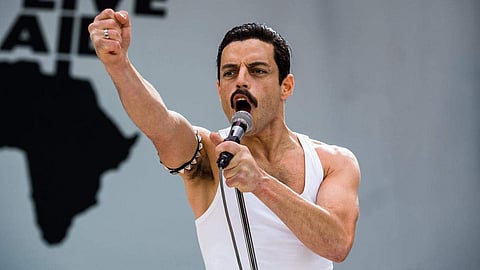Bohemian Rhapsody Review: A satisfying biopic with a thunderous final act
Rating:(3.5 / 5)
There is a scene early in Bohemian Rhapsody where Freddie has just named the band Queen and sketched out their logo. As the camera spirals top down slowly, he says, "The name is outrageous and nobody is more outrageous than me," to Mary (and to us). Almost like he wants to illustrate this statement, he reaches out to the piano under which he is lying down and he starts playing on it. This scene is eerily like the one in Amadeus (1984) where Mozart does something similar to show-off. Maybe it was a tribute by Bryan Singer (the credited director even though he was fired towards the end of filming) to two geniuses, who were both excellent live performers, left an indelible legacy and passed away too soon.
Cast: Rami Malek, Gwilym Lee, Ben Hardy, Joseph Mazzello, Ben Hardy
Director: Bryan Singer
Bohemian Rhapsody, while masquerading as a biopic of the legendary band Queen, is actually a not-so-historically-accurate biopic of their lead singer, the greatest voice to grace rock music - Freddie Mercury. Originally supposed to be played by Sacha Baron Cohen, the film eventually found its lead in Rami Malek. The Mr Robot star, is physically shorter, leaner and has much bigger eyes than Freddie, but when he goes on stage and starts belting out one Queen hit after another, you only see Freddie and his prodigious stage presence. The casting is near perfect; the actors playing Brian May (Gwilym Lee is credited for this role, but I wonder if Brian didn't travel back in time himself), Roger Taylor (a wonderful Ben Hardy) and John Deacon (Joseph Mazello) all look and behave the parts at the four stages that the film traverses - 1970, 1974-75, 1980 and 1985.
The film opens with one of the band's signature songs, Somebody to Love, as Queen are ready to perform at Live Aid. It is an impressive placement because the song is quintessential Freddie - melancholic lyrics, upbeat rhythm and belted out like the cry for help that it probably was. "I just gotta get out of this prison cell; one day I'm gonna be free, Lord!" sings Freddie who is constantly seeking love. Did he not get enough from his parents? A photograph of young Freddie with his boxing gloves, is one that his father holds dear to heart. He has never really accepted his son's choices. When John Reid comes forward to manage Queen, he asks what makes Queen different, to which Freddie replies, "We're four misfits who don't belong together; we're playing for the other misfits. They're the outcasts, right at the back of the room. We're pretty sure they don't belong either. We belong to them." At another point, he says when he is one with the audience, he cannot ever sing a note off-key. Maybe that is where he found love, and perhaps that explains why Queen and their live performances were loved so by audiences.
But what about the times Freddie was off-stage? This PG-13 film cannot delve much into his bombastic personal life, and it is here that the film largely loses its footing. While his relationship with his heterosexual partner, Mary Austin (an assured Lucy Boynton) is depicted meaningfully, the film doesn't delve deep into his relationships with men and how that influenced his music. We do, however, get a nice scene when Freddie comes to terms with his sexuality over the song, Love of My Life, which he wrote for Mary.
Bohemian Rhapsody has Brian May and Roger Taylor as executive producers, and maybe that is why it is quite vanilla and formulaic, unlike anything the band has done musically. But then again, when they set out to make the film, they had clearly stated that their objective was to introduce Queen to a whole new audience, while not doing a disservice to the existing ones. And this they have done remarkably well with the behind-the-scenes genesis of Queen staples, We Will Rock You, Another One Bites the Dust, and of course, the titular Bohemian Rhapsody. The last one is rejected by Ray Forster (a Mike Myers cameo), who says, "We need a song teenagers can bang their heads to in a car. Bohemian Rhapsody is not that song," in a reference to Wayne's World (1992), where Mike Myers does exactly that.
The film saves the best for the last. It ends with a scene-by-scene remake of what is acknowledged by many to be the greatest live performance ever - Queen at Live Aid, 1985. It is a 15-minute masterclass in staging, cinematography, and editing. And when you end up clapping in unison for Radio Gaga or yodelling along with him or trying to control the flowing tears as you sing We are the Champions, you know that 28 years after his death, Freddie Mercury has once again successfully manipulated his audience into being an integral part of his concert. This time inside the confines of a cinema hall.

